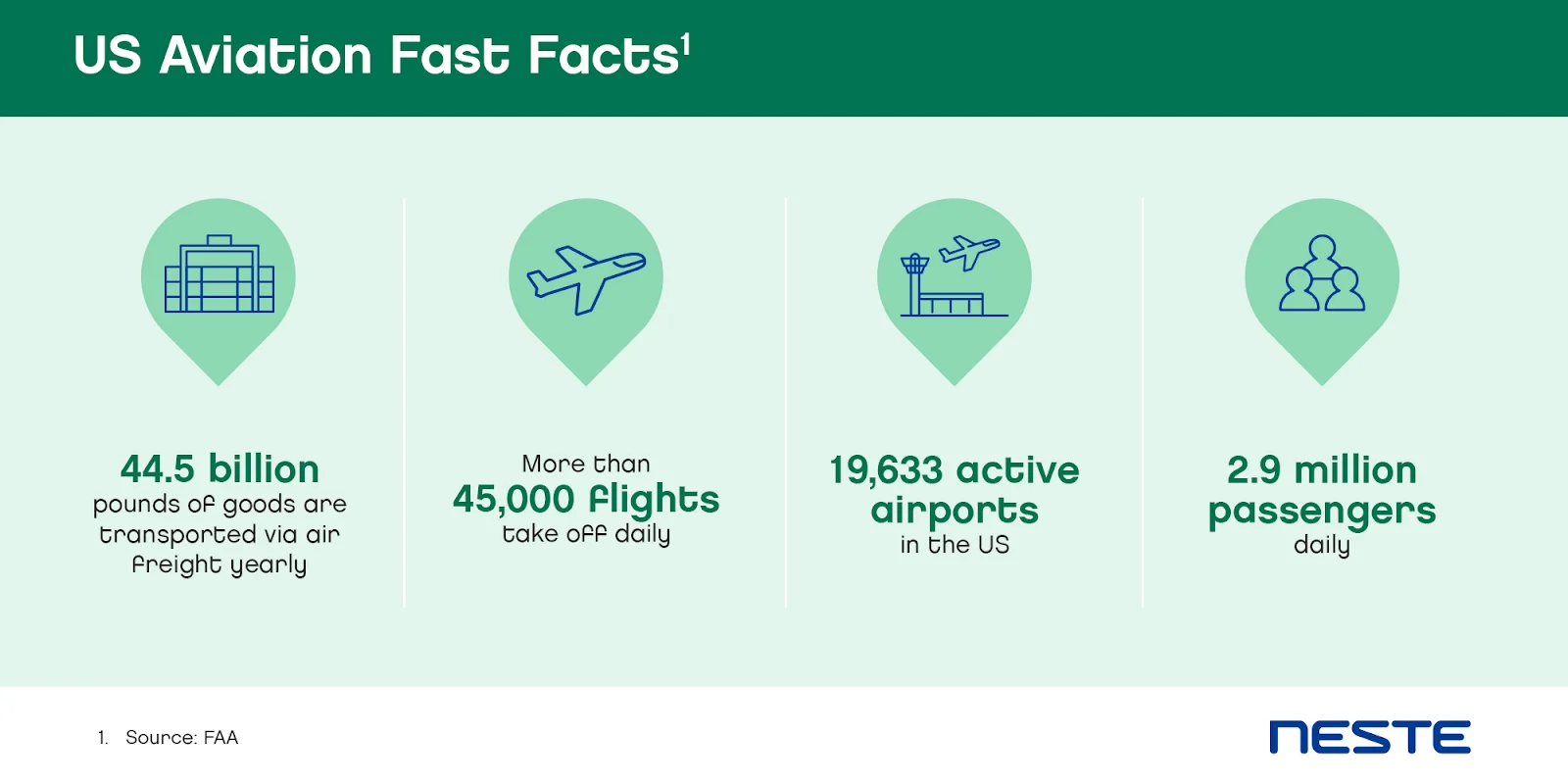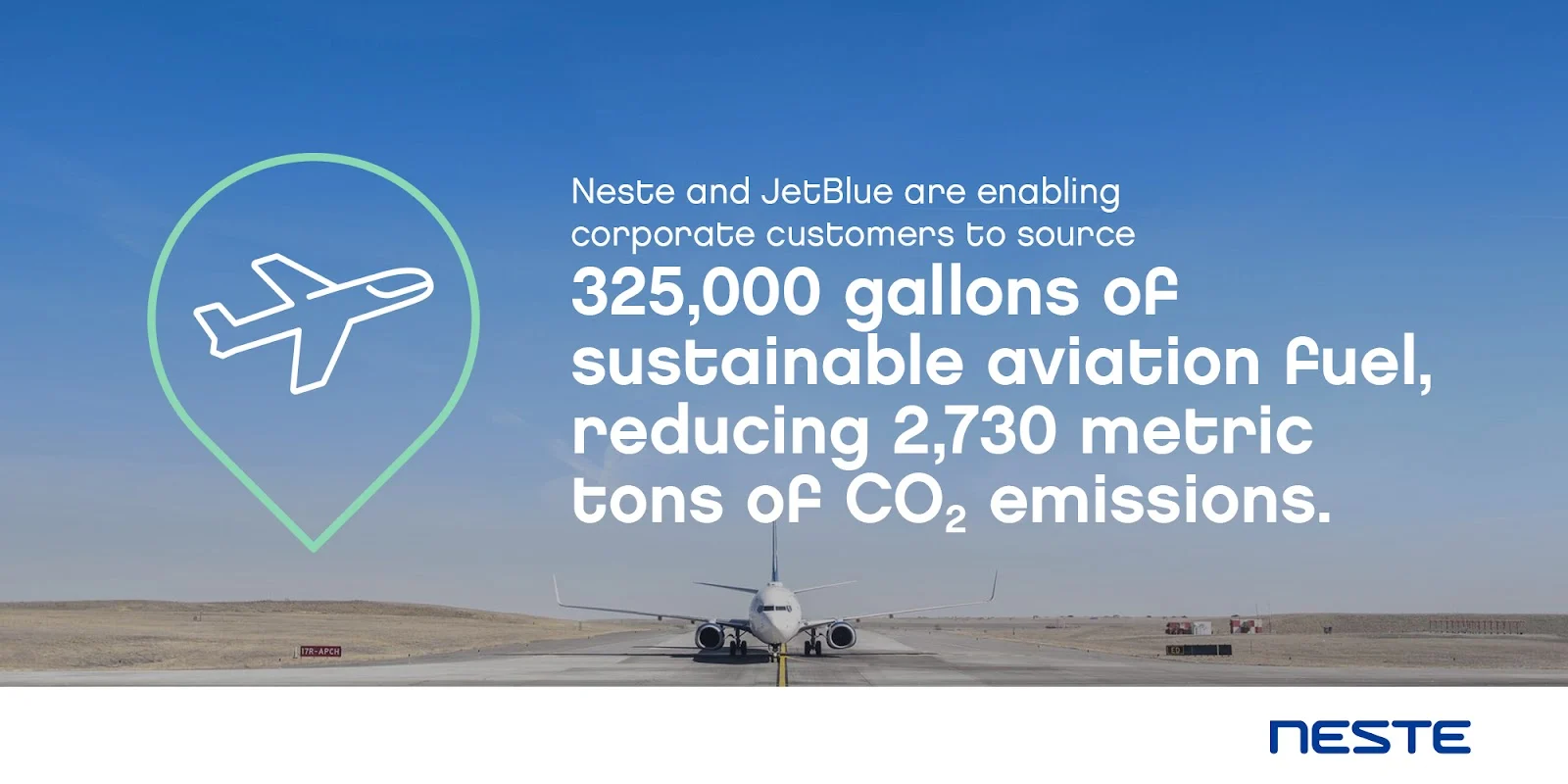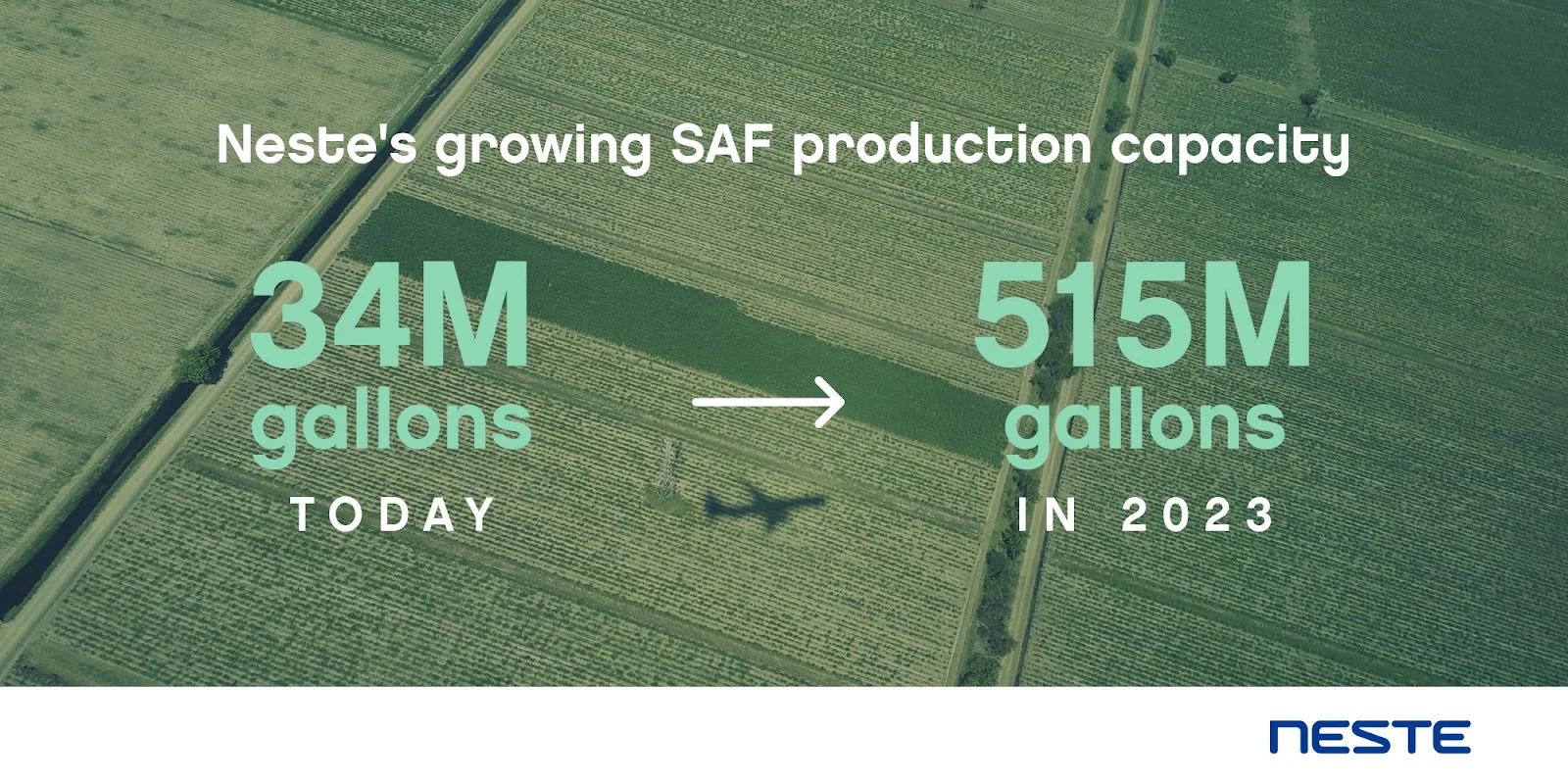
Case story
8 minute read
Neste and JetBlue partner to make flying more sustainable
Air travel is recognized for more than its ability to bring travelers to new destinations and reunite friends and family – it is also recognized as one of the most carbon intensive transportation modes. While air travel currently accounts for 2-3% of global emissions, as a “hard to decarbonize” industry, aviation’s proportional impact becomes more apparent as other industries accelerate sustainability efforts. As a safe, proven replacement for fossil jet fuel, sustainable aviation fuel, or ‘SAF’, will be essential for the industry to reach the 2050 net-zero carbon emissions goal.
Achieving this goal may seem daunting, especially as air travelers in the U.S. are forecasted to increase from 1.06 billion in 2020 to 1.47 billion in 2040. More flights mean more emissions, so the aviation industry must find a way to keep up with demand without increasing greenhouse gas (GHG) emissions.

But imagine if there was a jet fuel that can immediately reduce lifecycle emissions, made by recycling carbon molecules already in the ecosystem, produced in existing refineries, and transported seamlessly by existing petroleum pipelines? That is now a reality as more airlines are looking into sustainable aviation fuel (SAF). In July 2020, JetBlue was one of the first airlines that offered customers this low-carbon, renewable drop-in fuel through a partnership with Neste and continues to regularly fly on Neste MY Sustainable Aviation FuelTM.

On its journey to net zero, JetBlue set an ambitious goal to reduce air travel emissions by 25% by 2030. The airline recognized the importance of SAF to enable low emission flying, and became one of the first U.S. airlines to adopt the fuel. After seeing the positive impact of SAF, JetBlue is committed to converting 10% of its fuel-buy to SAF by 2030.To achieve this goal, JetBlue needed a SAF partner with commercial production, a proven track record of supplying SAF safely to airports and airlines, and a transparent, sustainable supply chain. Neste is uniquely positioned to deliver on all three criteria, and began supplying SAF to JetBlue in July 2020. The partnership delivers meaningful and immediate action to fight climate change - by reducing carbon emissions from air travel and contributing to cleaner air in communities surrounding airports.
One of the first airlines in the US to adopt the use of SAF
Committed to converting 10% of its fuel-buy to SAF and reducing air travel emissions by 25% by 2030
Enabled corporate customers to keep 2,730 metric tons of CO2 emissions* out of the atmosphere by providing 325,000 gallons of Neste MY SAF
A partnership between two sustainability leaders
In 2020, the aviation industry was severely affected by the COVID-19 pandemic. Despite these challenges, JetBlue decided to double down on its sustainability commitments. The airline has committed to achieve carbon neutrality for all its domestic flights. Today, this carbon neutrality is largely accomplished through carbon offsetting. However, continued improvements to aircraft, operational efficiencies, and transitioning to SAF are expected to be the major driver of emission reductions from JetBlue’s future flights.
"People are aware of the footprint of their personal travel. At the same time, people love to travel and want to continue to do so. We see it as our responsibility to deliver a sustainable flight experience so that people may continue to see loved ones and explore the world while not being concerned about their impact."
As the forerunner in developing sustainable aviation fuel solutions, Neste was ready to help JetBlue achieve their sustainability ambitions faster. Neste’s expertise and ability to produce SAF at scale met JetBlue’s immediate need to get SAF in aircraft faster. On top of that, Neste’s transparent, sustainable supply chain gave JetBlue certainty that the SAF powering its aircraft was produced in a way that protects forests, air, water and human rights.
JetBlue’s partnership with Neste began in 2020. JetBlue, along with a consortium of other airlines, agreed to purchase and introduce SAF to San Francisco International Airport (SFO). The consortium chose Neste as the supplier, because the company was able to produce the needed volumes and offered a breakthrough in the supply chain. Neste, for the first time, would directly deliver SAF via pipeline - the very same pipelines that were originally created for fossil fuels.
This milestone has been called a “climate quantum leap'' for aviation. To date, more than 8.7 million gallons of neat SAF have been supplied to SFO, reducing over 75,000 tons GHG emissions reduction compared to using conventional Jet-A fuel.
“Despite the constant wave of disruptive issues affecting the aviation industry, JetBlue has stayed committed to sustainability,” said Chris Cooper, President of Neste US. “JetBlue understands that there is no time to waste in the fight against climate change - that’s what makes them a great leader in sustainability and a great partner for us.”
A safe, proven and today solution
Neste worked closely with JetBlue to test and demonstrate the technical aspects of SAF in aircraft engines, as well as showcase that SAF can be delivered safely to airlines and airports using existing fueling infrastructure. Most importantly, Neste was able to demonstrate that SAF is proven to work safely. For JetBlue, understanding all the specifics of SAF not only made them an informed customer, but enabled them to be a proponent of this low carbon solution.
“We worked with the JetBlue team closely to answer their questions about our SAF’s climate benefits, how it blends with conventional jet fuel, and how it works in their aircraft. The team wanted to understand these details so that they could help advocate for the use of SAF. As the first fuel producer that has commercial volumes available at the San Francisco International Airport, Neste made it easier for JetBlue to accept this fuel in their operations,” said Cooper.
Not only was the process of introducing SAF seamless, there was also no change to the customer experience, and JetBlue didn’t need to offer additional training to their pilots or make modifications to their engines - the only difference is a reduction in carbon emissions when JetBlue’s aircraft are powered by SAF.
“I’ve wanted to be a pilot for as long as I can remember. Bringing families together and introducing them to new destinations is a thrill. As our industry continues to grow, we need to ensure we focus on addressing our environmental impact through our emissions. I was excited to see JetBlue address this head on with our partnership with Neste to start using SAF in the operation. It is a meaningful and immediate step to reduce our impact. As a pilot, there is no need for additional training and no noticeable difference in the operation of the aircraft using this fuel. The only difference is the significant emissions reduction when operating aircraft powered by SAF. ” – Chris Lum, System Chief Pilot, JetBlue
Enabling more sustainable business travel
Employee travel is one of the contributors to corporate carbon emissions. As business travel continues to rebound, SAF provides the most meaningful, immediate way for companies who look to reduce their Scope 3 emissions and fly more sustainably.
In January 2022, JetBlue launched the Sustainable Travel Partners program. The program enables JetBlue’s corporate customers to access Neste’s low-carbon fuel by purchasing SAF certificates and complimentary carbon offsetting on all domestic flights operated by the airline.
Members of the program also have access to personalized travel data and analysis for more accurate emissions reporting, so they can understand the positive climate impact they are making by investing and adopting SAF.
“Prior to launching, Neste met with the first members of the Sustainable Travel Partners program to answer questions about feedstock and GHG reductions through SAF as well as share success stories,” said Bodgan. “We wanted to create more than a transactional program where companies buy more SAF. Through our partnership, Neste helped us demonstrate how investing in SAF delivers meaningful and immediate climate impact.” Through the Sustainable Travel Partners program, JetBlue’s corporate partners are helping source 325,000 gallons of SAF, reducing 2,730 metric tons of CO2 emissions. The strategic partnership between Neste and JetBlue is accelerating the adoption of SAF in business aviation.

Expanding SAF availability
Looking to the future, this partnership has no signs of slowing down.
JetBlue sees sustainability as the future of flying. With a mission to inspire humanity, the airline has maintained its focus on providing a pleasurable travel experience for its corporate and commercial customers – with sustainability being a major component of fulfilling this mission.
“We recognize that we are protecting the destinations vital to our business,” Bodgan stated. “Approximately one-third of JetBlue’s destinations are beautiful, coastal locations, so by taking action to fight climate change today, we are protecting the scenery you see today for your grandchildren.”

JetBlue is committed to replacing 10% of their fuel to SAF by 2030 and reaching net-zero by 2040. Neste is ready to keep helping JetBlue achieve this goal. By the end of 2023, Neste will have a production capacity of 515 million gallons of SAF per year - 1500% more than what is being produced today.
Through this partnership, Neste and JetBlue are taking meaningful, measurable steps in reducing aviation’s contribution to climate change and leading the way to significantly reduce air travel emissions, and inspiring the use of SAF for both commercial and business air travel.
For more information on the benefits of SAF, please visit: www.neste.com/products-and-innovation/product-and-safety-data-sheets
*Calculations use established life cycle assessment (LCA) methodologies, such as CORSIA methodology.